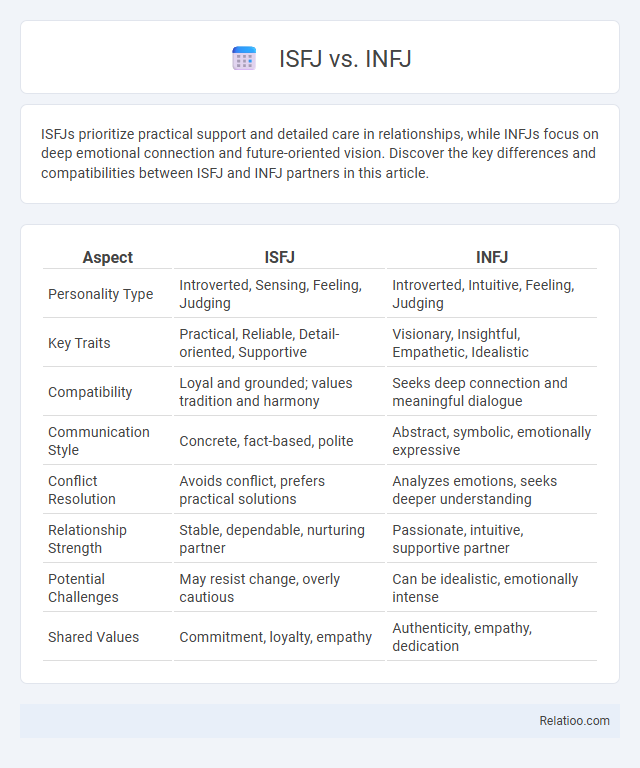ISFJs prioritize practical support and detailed care in relationships, while INFJs focus on deep emotional connection and future-oriented vision. Discover the key differences and compatibilities between ISFJ and INFJ partners in this article.
Table of Comparison
| Aspect | ISFJ | INFJ |
|---|---|---|
| Personality Type | Introverted, Sensing, Feeling, Judging | Introverted, Intuitive, Feeling, Judging |
| Key Traits | Practical, Reliable, Detail-oriented, Supportive | Visionary, Insightful, Empathetic, Idealistic |
| Compatibility | Loyal and grounded; values tradition and harmony | Seeks deep connection and meaningful dialogue |
| Communication Style | Concrete, fact-based, polite | Abstract, symbolic, emotionally expressive |
| Conflict Resolution | Avoids conflict, prefers practical solutions | Analyzes emotions, seeks deeper understanding |
| Relationship Strength | Stable, dependable, nurturing partner | Passionate, intuitive, supportive partner |
| Potential Challenges | May resist change, overly cautious | Can be idealistic, emotionally intense |
| Shared Values | Commitment, loyalty, empathy | Authenticity, empathy, dedication |
Introduction to ISFJ and INFJ Personality Types
ISFJ and INFJ personality types, both part of the Myers-Briggs Type Indicator (MBTI), exhibit distinct cognitive functions shaping their behavior and interactions. ISFJs, known as "Defenders," prioritize practical support and detailed organization driven by Sensing and Feeling functions, thriving in structured, service-oriented environments. INFJs, termed "Advocates," emphasize visionary insight and deep empathy, guided by Intuition and Feeling, often drawn to creative problem-solving and meaningful connections, sharing a mutual dedication to helping others despite their differing approaches.
Key Differences Between ISFJ and INFJ
ISFJ and INFJ personalities differ primarily in cognitive functions; ISFJs rely on Si (Introverted Sensing) and Fe (Extraverted Feeling), focusing on concrete past experiences and practical support, while INFJs use Ni (Introverted Intuition) and Fe, emphasizing future possibilities and abstract concepts. Your ISFJ preference leans toward traditional, detail-oriented caregiving, whereas INFJs prioritize visionary insights and deeper psychological understanding. Shared interests include empathy and a desire to help others, but ISFJs tend to excel in tangible tasks, and INFJs thrive in strategic planning and conceptual problem-solving.
Cognitive Functions: ISFJ vs INFJ
ISFJ personality types lead with Introverted Sensing (Si), emphasizing detailed past experiences and sensory information, while INFJs lead with Introverted Intuition (Ni), focusing on abstract patterns and future possibilities. Both types share Feeling (Fe) as their auxiliary function, driving their shared interest in understanding and supporting others' emotional needs. The key distinction lies in ISFJ's practical, detail-oriented approach versus INFJ's future-focused, visionary mindset.
Approach to Relationships
ISFJs exhibit a practical, nurturing approach to relationships, emphasizing loyalty and comfort through consistent support and attentiveness to others' needs. INFJs prioritize deep emotional connection and understanding, often seeking meaningful, visionary partnerships that align with their values and purpose. Your relationship style may integrate ISFJ's reliability with INFJ's emotional depth, creating a balanced dynamic focused on both stability and profound empathy.
Communication Styles
ISFJs communicate with a practical, detail-oriented style, focusing on clarity and reliability, while INFJs prioritize insight, empathy, and abstract concepts, often using metaphor and intuition to convey deeper meanings. Both types value meaningful, one-on-one conversations, fostering trust and understanding through active listening and emotional sensitivity. Your communication will benefit from recognizing ISFJ's grounded approach alongside INFJ's visionary perspective to balance clarity with depth.
Career Preferences and Workplace Behavior
ISFJs excel in structured environments that value loyalty and meticulous attention to detail, often thriving in careers related to healthcare, administration, or education. INFJs prefer roles that align with their visionary and empathetic nature, such as counseling, writing, or strategic planning, where they can drive meaningful change. Your shared interest in helping others and strong work ethic manifests in collaborative workplace behavior, though ISFJs lean toward practical task management while INFJs focus on long-term goals and abstract insights.
Decision-Making Processes
ISFJs rely heavily on practical evidence and past experiences to guide their decision-making, focusing on maintaining harmony and fulfilling responsibilities. INFJs, by contrast, prioritize intuitive insights and long-term vision, seeking to align decisions with their core values and future goals. Your shared interest in thoughtful, value-driven choices fosters a deep respect for well-considered decisions, balancing empathy with careful analysis.
Strengths and Challenges of ISFJ and INFJ
ISFJs excel in practical support and attention to detail, demonstrating strong organizational skills and a deep sense of responsibility, while INFJs thrive in understanding complex emotions and envisioning future possibilities, showcasing empathetic insight and strategic thinking. Both types share a commitment to helping others and value meaningful connections, but ISFJs can struggle with adapting to change, and INFJs may face challenges in setting personal boundaries. Emphasizing strengths such as ISFJ's reliability and INFJ's visionary mindset highlights their complementary approaches to problem-solving and interpersonal relationships.
Personal Growth Tips for ISFJ and INFJ
ISFJs and INFJs both prioritize personal growth through self-reflection and meaningful connections, with ISFJs focusing on practical organization and nurturing relationships, while INFJs emphasize intuition and deep insight. You can enhance your development by adopting ISFJ strategies like creating structured routines and practicing empathy, alongside INFJ techniques such as journaling and exploring abstract ideas. Shared interests in personal growth include mindfulness, emotional intelligence, and balancing internal values with external responsibilities.
Conclusion: Choosing Between ISFJ and INFJ
Choosing between ISFJ and INFJ depends on whether Your focus is on practical support or deep intuitive insight. ISFJs excel in providing structured care and reliability, while INFJs offer visionary guidance and emotional understanding. Both personalities share a commitment to helping others but differ in approach and motivation.

Infographic: ISFJ vs INFJ
 relatioo.com
relatioo.com